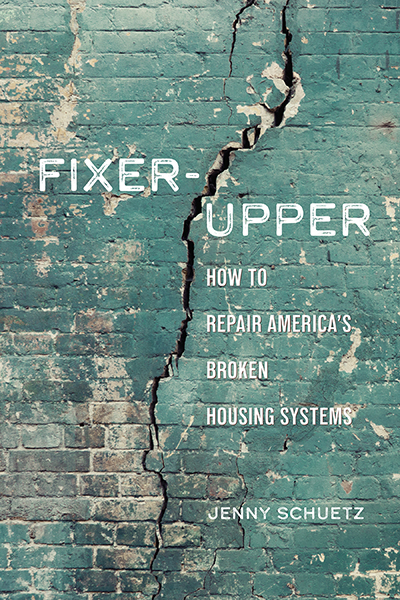Dec. 1, 2022
Looking for the latest in planning books? The Journal of the American Planning Association has you covered, with a focus on books relevant to both planning practitioners and academics. The topics range from housing policy to gig economy drivers, waste management, urban revitalization, and how Florida's sprawling development patterns came to be.
Stay in-the-know
Sketch out your own reading list or get something for that special planner in your life with help from these excerpts from JAPA's latest reviews (click through to read the full review or buy the book from a local bookseller).
A big thanks to our book reviewers: Jennifer Minner, Shayna Goldsmith, Jesus M. Barajas, Carlton Basmajian, and Stefan Norgaard.
Our recommended books are:
Resisting Garbage: The Politics of Waste Management in American Cities
Lily Baum Pollans, 2021, University of Texas Press, 248 pp., $45 hardcover

Resisting Garbage is a parable of two cities — one defiant and the other compliant — in the Sisyphean struggle to manage municipal household solid waste in Seattle (Washington) and Boston (Massachusetts). An important investigation of material flows in urban wasteways, this book is deeply insightful, offering much for planning practitioners, planning scholars, and policymakers to consider. It offers a cogent and hopeful rationale for planning, citizen participation, and innovative governance even as it remains firm in presenting the dire consequences of the lackluster performance in municipal recycling efforts in the U.S. and the lack of traction in reducing the production of waste.
—Review by Jennifer Minner, Cornell University
Fixer-Upper: How to Repair America's Broken Housing Systems
Jenny Schuetz, 2022, Brookings Institution Press, 210 pp., $29.99 paper

Dr. Jenny Schuetz's new book describes America's broken housing systems and proposes solutions for repairing them. In Fixer-Upper, she wrangles a seemingly intractable issue into a cogent brief, written in plain, disciplined language. Readers who are new to the subject will also derive the core principles of urban economics by seeing them at work, making this a phenomenal introduction for government officials at all levels, civic leaders, students, and the broader public. Planners, housing advocates, and policymakers, meanwhile, may discover new ideas for how to nurture the nascent pro-housing movement, including language to distill the dilemmas confronting their own communities. This pithy treatise examines the structural inequities in housing, makes a compelling ethical and economic argument that systemic change benefits everyone, and — though she is under no illusion that it will be easy — points the way forward.
—Review by Shayna Goldsmith, University of Texas at Austin
Spent Behind the Wheel: Drivers' Labor in the Uber Economy
Julietta Hua and Kasturi Ray, 2021, University of Minnesota Press, 208 pp., $25 paper

Planning research on ride-hailing has mostly examined travelers' responses to the new service, such as whether Uber and Lyft complement or compete with public transit. Spent Behind the Wheel looks at another side of ride-hailing, focusing on the labor conditions of professional taxi and ride-hailing drivers and challenging the corporate notion that working as a driver can lead to increased economic freedom. Authors Julietta Hua and Kasturi Ray, professors of women and gender studies, apply their disciplinary backgrounds to their book, which they describe as "best understood as a feminist legal and cultural study of professional passenger driving in the wake of the gig economy."
—Review by Jesus M. Barajas, University of California, Davis
The Swamp Peddlers
Jason Vuic, 2022, University of North Carolina Press, 268 pp., $29.95 paper

Jason Vuic's new book, The Swamp Peddlers, explores a side of Florida that is known among historians of the state but not by many others: land speculation. The book focuses on the practice of installment sales — "the alpha and omega of Florida's boom" — a scheme that took marginal lands, the edges of swamps, former cattle ranches, and slash pine forests and transformed them into residential subdivisions jammed cheek by jowl with 80-foot-by-125-foot lots. Buying vast tracts at dirt-cheap prices, speculators turned profits on selling small lots for $10 (or $20 or $30) down and $10 a month to pensioners in the Frost Belt. The buyers got a plot of land that could be developed into a single-family house. In theory. As Vuic explains, this happened only sometimes. Sun Belt sprawl is a plastic embodiment of how Americans have built themselves into the jaws of ecological disaster, all in the name of warmer weather. In Florida the problem is sea level rise; in Texas it is heat; in California it is drought and fire. The list goes on. Every Sun Belt metropolis is now ringed with subdivisions almost exactly like the ones Vuic chronicles. And almost every one of them suffers from the same willful blindness. Swamp Peddlers contributes to the quest to understand why Florida (and the Sun Belt) is the way it is — and reveals why that quest is far from over.
—Review by Carlton Basmajian, Iowa State University
The Paradox of Urban Revitalization
Howard Gillette, Jr., 2022, University of Pennsylvania Press, 344 pp., $39.95 hardcover

Howard Gillette, Jr.'s The Paradox of Urban Revitalization is a welcome addition to the urban planning history and theory canon. Through an in-depth, multi-city empirical examination, Gillette discusses urban revitalization in the context of American cities' changing governance arrangements. The paradox advanced by Gillette is that urban revitalization geared to wealthier, whiter residents occasions displacement and deepening inequality for long-time working-class residents and residents of color. Gillette shows how local government policymaking can make a difference and that there are ways — albeit imperfect — to counter growth machine politics of corporate subsidies and creative class hangouts. Gillette advances that a paradox of "progress" is grinding poverty and dispossession. Contemporary city leaders must intentionally harness urban growth toward more equitable development. Experts and non-experts alike have much to learn from that frame.
—Review by Stefan Norgaard, Columbia University.




